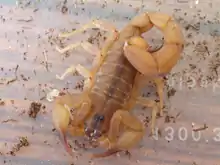Buthoidea
Buthoidea is the largest superfamily of scorpions. Its members are known as fat-tailed scorpions and bark scorpions. A few very large genera (Ananteris, Centruroides, Compsobuthus, or Tityus) are known, but a high number of species-poor or monotypic ones also exist.[1] They occur in the warmer parts of every major landmass on Earth, except on New Zealand.[1] The superfamily was established by Carl Ludwig Koch in 1837.[1]
| Buthoidea | |
|---|---|
 | |
| Odonturus dentatus | |
| Scientific classification | |
| Kingdom: | Animalia |
| Phylum: | Arthropoda |
| Subphylum: | Chelicerata |
| Class: | Arachnida |
| Order: | Scorpiones |
| Suborder: | Neoscorpionina |
| Superfamily: | Buthoidea C. L. Koch, 1837 |
| Families | |
| |
Taxonomy
Five families are placed into Buthoidea, two extant families Buthidae and Microcharmidae, plus three extinct families.
- †Archaeobuthidae (Lebanese amber, Hauterivian)
- Buthidae (Modern, Cenomanian - Recent)
- Microcharmidae (Modern, Recent)
- †Palaeoburmesebuthidae (Burmese amber, Cenomanian)
- †Protobuthidae ( Grès à Voltzia Formation, Anisian)
- †Sucinlourencoidae (Burmese amber, Cenomanian)
References
- Rein, Jan Ove (2008): The Scorpion Files - Buthidae. Retrieved June 25, 2008.
This article is issued from Wikipedia. The text is licensed under Creative Commons - Attribution - Sharealike. Additional terms may apply for the media files.